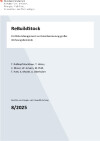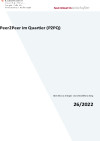Suchergebnisse für "Factsheet: Energietechnologien gestalten, die für alle sinnvoll und nutzbar sind"
#EEG++ Digital Energy Communities Optimized
The project aims to develop an innovative energy system for plus-energy neighborhoods by integrating advanced photovoltaic installations, IoT technology, and energy communities to maximize the self-consumption of renewable energy while ensuring economic efficiency and user-centricity.
Co-Housing Gutenberg: Integrated Sector Coupling for Shared Living, Energy, and Mobility
The "CoHoGutenberg" project aims to establish a sustainable co-housing model in the rural community of Gutenberg, Styria, by combining sufficiency principles with state-of-the-art energy technologies.
ReBuildStock - Portfolio-Management zur Dekarbonisierung großer Wohnungsbestände

Portfolio-Managementmethode zur Unterstützung der Entscheidungsprozesse von Eigentümer:innen größerer Wohnungsbestände bei der Erarbeitung von Strategien zur schnellen und sozialverträglichen Dekarbonisierung ihrer Gebäudebestände.
Schriftenreihe
8/2025
T. Roßkopf-Nachbaur, T. Weiss, C. Moser, W. Amann, M. Ploß, T. Hatt, A. Mundt, A. Oberhuber
Herausgeber: BMK
Deutsch, 115 Seiten
Downloads zur Publikation
FavoriteFlows – Innovative solutions for water and energy cycles in buildings for a climate fit city
Demonstration of detailed planning work and implementation of water cycles (building-integrated constructed wetland wastewater treatment) and energy cycles (wastewater heat exchanger) on a large residential apartment development for climate resilience, resource efficiency and high living standard.
sustAIn4Build - AI competence for sustainable building management in climate neutral cities
The objective of the project sustAIn4Build is to increase energy efficiency and sustainability in the building sector by using artificial intelligence (AI). Industry-specific training programs support Austrian companies to develop a workflow for integrating AI technologies into their processes, enabling them to develop resource-saving, cost-effective and sustainable solutions. This strengthens their competitiveness and contributes to the achievement of European decarbonisation goals.
NEBKrit - Quality criteria for buildings and neighbourhoods on the basis of the New European Bauhaus
Develop criteria of aesthetics and social inclusion based on the values of the New European Bauhaus to complement existing sustainability criteria in order to evaluate buildings and neighbourhoods more broadly. Since todayʼs necessary transformation of the economy always includes cultural and social aspects, such a broader assessment makes more sense than todayʼs usual methods.
P2PQ - Peer2Peer im Quartier

Das Projekt Peer2Peer im Quartier befasst sich mit der konkreten Umsetzung von Anwendungen zu Photovoltaik-Eigenverbrauchsoptimierung sowie Peer-to-Peer-Beziehungen auf Basis der Blockchain-Technologie in Quartieren und deren Validierung im Echtbetrieb.
Schriftenreihe
26/2022
Herausgeber: BMK
Deutsch, 43 Seiten
Downloads zur Publikation
ReSpace – Reclaiming Spaces
ReSpace is developing an AI-based model for identifying, categorizing, and activating sealed areas. Existing data sources (aerial and satellite images, mobile network data, land registry entries) are integrated and enhanced with dynamic analysis to derive evidence-based recommendations for action.
RCC2 - Life cycle assessment of heatable formwork for CO2-reduced and climate-neutral concrete
Experimental development of innovative formulations of CO2-reduced concrete and heated formwork to support early strength development in wintry temperatures.
ReBuildStock - Portfolio management for the decarbonisation of larger housing stocks
Portfolio management method to support the decision-making processes of owners of larger housing stocks in developing strategies for the rapid and socially responsible decarbonisation of their building stock.
Urban Sky - Satellite-based planning and analysis applications for climate-neutral and resilient cities
The project investigates how satellite data can support cities and municipalities (e.g. urban development, spatial energy planning, mobility transition). Based on demand and potential analyses, service concepts will be derived that integrate existing data and tools with satellite applications. The results will be presented in a study and a Space4Cities implementation roadmap.
GeoDatKlim - Geo Data and Satellite Data for Carbon Neutral Cities
The Vienna Geospace Hub innovation lab will help optimize the application of geospatial and satellite data to solve complex urban challenges. The innovation lab serves as a networking platform for administration, science, economy, as well as a development and test environment for innovative use cases.
IntEGrity - Integration and Diffusion of Energy Communities
IntEGrity aims at fully integrating energy communities in the existing energy landscape in order to push for efficient diffusion and to use the potential of the positive contribution to energy awareness, efficiency and climate neutrality. In order to fully enable integration, the project explores innovative developments on three levels - social level, energy community level and service level.
StirliQ+ Component development of the expansion Stirling generator with supercritical fluid as working & lubrication medium
Technical research and further development of details or components of the novel StirliQ engine, which has the potential to overcome the technical hurdles of conventional Stirling engines. On the basis of simulations as well as a laboratory plant, a narrowing down of the process parameters with regard to a resilient pre-dimension of apparatus components is carried out.
Klimagärten³ - Biodiverse, CO2-saving, close to nature: climate gardens³ for Austria's garden future
The Klimagärten³ project is dedicated to the climate-friendly design of gardens and green spaces in Austria. The focus is on activating the previously untapped climate protection potential of private and public gardens. Through research, practical trialling and social networking, ways are shown in which gardens can act as CO₂ sinks and strengthen biodiversity.
50 green houses - Development and demonstration of a low-tech façade greening system
Development of a cost-efficient all-in façade greening system („Greening-Toolkit“) including a maintenance concept, involving all trades and processes, for a broad (facing roads) implementation on facades in the urban built environment, combined with a process innovation for simplification of all necessary coordination processes.
InSite - Monitoring and evaluation of innovative demonstration buildings
In the "Stadt der Zukunft" and "Smart City Initiative" programmes, a large number of demonstration projects have been implemented in recent years. To be able to evaluate the developed innovations in a uniform and comparable form and to make the knowledge gained accessible to implementers, InSite subjects 10 selected objects from these programmes to energy and ecological monitoring as well as sociological surveys over a period of 24 months. The interpreted results are publicly available as a published study and as an interactive online platform.
Climate-School-Life - Preparation of the climate-neutral educational campus in Gratwein-Straßengel
The project aims to start the transformation process of the educational campus of the market town of Gratwein-Straßengel into climate-neutrality. The need for the expansion and modernisation of the elementary school forms the central part of this development. The project provides an integrated district concept for the four central infrastructure topics of the project: urban development, architecture, mobility and energy. Participation processes of the population and innovative financing models are further components of the exploration.
PEQBacker: Integrated District Planning - Enabler on the way to a Plus-Energy District
Development of guidelines for the implementation of Plus-Energy District coordination units based on research of success factors, exploration of mission elements of existing structures and consultation of a broad stakeholder group with the goal of increasing the transformation of existing and emerging neighbourhoods toward Plus-Energy Districts.
ZQ3Demo - Implementation of urban Future Quarters including stakeholder integration and legally and economically replicable solutions
ZQ3Demo accompanies three innovative urban quarters in Vienna to demonstrate and further develop ecologically and economically sustainable solutions for the implementation of Plus-Energy-Quarters (PEQ) on the basis of real-life examples.
